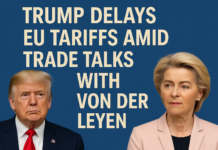Ford Hikes: Ford Motor Co. has formally raised prices for some of its Mexico-made vehicles, one of the first big carmakers to respond to the economic pressure from new tariffs imposed by the U.S. government. The increased prices went into effect on May 2, 2025, and will be felt by dealerships by late June.
Price Increases of up to $2,000 on Certain Models
The models impacted are the Mustang Mach-E electric SUV, Maverick pickup truck, and Bronco Sport, with prices increasing up to $2,000 on some versions. The hikes are both due to mid-year pricing adjustments as well as the cost burden of new trade tariffs, according to a company memo distributed to dealers.
A Ford spokesman said the price adjustments reflect the standard mid-year revisions, but also factor in “some tariffs we are facing.” Notably, Ford took pains to stress it has not been passing the entire cost of tariffs on to consumers, attempting to keep vehicles as inexpensive as possible in the face of outside pressure.
Also read: Navarro Dismisses Vietnam’s Zero-Tariff Deal: Find Out The Details
Trump’s Tariffs Disrupt Auto Sector
The cost increase is in retaliation to President Trump’s recent tariffs, which have sent a ripple of uncertainty through the auto industry. Ford has estimated that the tariffs will impose an additional $2.5 billion in expense in 2025 alone. But the automaker thinks that it can make up for some $1 billion of that on its own with cost-cutting measures.
Other car manufacturers are also under pressure. General Motors (GM) estimated a whopping $4 to $5 billion in added expenses from tariffs.
Trump recently relaxed the tariffs on auto components, enabling manufacturers to claim credits for U.S.-made components. The action is intended to avoid double-tariffs on raw materials. The 25% tariff on foreign-assembled vehicles, some 8 million units imported each year, however, continues.
Ford’s U.S. Manufacturing Advantage
Ford is more poised than most competitors to ride out the tariff storm. As Barclays analysts point out, 79% of Ford vehicles sold in the United States are domestically produced, vs. GM’s 53%. This homegrown firepower gives Ford an insulation against cost inflation on imported autos.
Nevertheless, Ford’s Maverick is one of its cheapest and best-selling models, is manufactured in Mexico. This puts the company at risk of higher costs that it has to offset without losing price-sensitive customers.
Discount Programs Continue Despite Increases
Despite the price increases, Ford is not cutting back on its incentive promotions. The automaker confirmed that it is continuing to offer discount promotions through the July 4 holiday weekend on several models, working to maintain demand while the market adjusts to the new pricing reality.
Ford stock fell 1.7% to $10.26 at midday trading after the news, which was a sign of investor concern over how long-term demand could be impacted by higher vehicle prices.
Industry-Wide Ripples
Ford’s action could induce other automakers to follow suit. Although Volkswagen’s Audi brand and Porsche have hinted at raising prices, the majority of firms have thus far refrained from increasing sticker prices. BMW, however, remains hopeful, reporting it believes U.S. tariffs will fall by July, based on talks with officials.
However, analysts warn that American car sales may dip by more than 1 million units annually if tariffs continue. Automakers that are heavily dependent on imports, such as Toyota, Hyundai, and Volkswagen, stand particularly at risk, with some importing more than 60% of their U.S. sales.
Also read: Where to Retire? Top 10 Tax-Friendly States for Retirees in the USA (2025)
Conclusion
Ford’s price increase is a turning point in how auto companies react to increasing trade tensions. With global supply chains still under strain and tariffs cutting deeper, the company’s move could be a bellwether for more general price movements across the industry. For consumers, that could translate into higher prices in the future—particularly for popular, affordable models.








